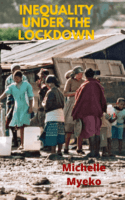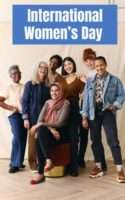2020 is proving to be a strange year. I remember in the beginning of January, watching the coronavirus making its way around the Hubei province of China, when schools and businesses were closed. In the beginning, I felt the closure of schools and businesses was an overreaction. The closing of schools there seemed to me worse than the actual ailment. Time has proven me very, very wrong. A virus that started on a different continent in the Northern Hemisphere has led to the closure of schools and universities on the southernmost tip of Africa. It has led to the closure of all businesses except for essential services like food, pharmacies and healthcare.
I feel like I am living in some dystopian horror film. The government initially announced that all schools would be closed from 18 March. A week later, an announcement of a 21-day lockdown was made. I have no doubt that the decision to close schools and businesses is the correct one. This model of dealing with the virus has helped China battle and win against this virulent strain.
In terms of the health aspect, the lockdown is a necessary step in South Africa. However, I know in my heart that the effect of the lockdown, socially and financially, will be just as bad if not worse than the actual virus. Let me explain why.
Schools in this country have been closed by presidential decree in response to the virus from 18 March. With the added 21-day lockdown, the proposed reopening of schools will be Friday 17 April. If the virus allows us to adhere to this timeline this will mean that school kids would have been at home for 29 days. This is a tragedy, not only because of the loss of learning time but because nine million school kids in South Africa rely on the National School Nutrition Programme for their only guaranteed meal of the day. Not going to school means that they are home, starving. In this lockdown children are going hungry.
The government has decreed that all South Africans stay home during this period and participate in social distancing in order to prevent the virus from spreading. This is a noble call. However for tens of thousands of South Africans home is not some brick, tiled structure with indoor plumbing. For tens of thousands of South Africans in informal urban settlements such as Alexandra, Diepsloot and Khayelitsha, home is a leaky, corrugated iron structure mere metres from other leaky, corrugated iron structures. In these homes there is no indoor plumbing and the proposed hand washing for people who cannot afford sanitizers, involves having to walk to a communal tap to access water from a tap that has been touched by hundreds of other hands. Social distancing in these circumstances is almost impossible.
Most families in the township of Alexandra live in yards that average two hundred square metres in size, where up to ten families have built individual shacks and share communal toilets. For South Africans living under these circumstances, social distancing is but a dream. Street vendors have been told to stop trading and, as a result, most households who rely on these informal businesses will go without; there simply will not be an income. They will have to be stuck in small shacks all day, without food and without a yard to walk around in. It does not take a sociologist to imagine the kind of anger that will breed in these circumstances where there is no income, no fresh air, no possibility of entertainment. Children in these informal settlements have no access to a garden yard to play in. For them space is something they experience on walks to school and upon entering the schoolyard. In the kind of households that I am describing there are usually no divisions within the shack. When adults have to bath, children are sent outside to play, suddenly access to the outside will be prohibited.
There are also other social issues at play, with this forced togetherness. Sexually abusive family members will have 24-hour access to their victims. For victims of sexual- and gender-based violence, this period will be one defined by torture and no respite from anguish.
Families on social grants who were worried about access to food before the lockdown on Thursday the 26th, took their SASSA cards and IDs to unregistered money lenders at extortionate interest rates in order to buy food so they too could access it during the lockdown.
On a television news programme that was flighted all over the world, Debora Patta, a famous news anchor, stood at a shopping centre in Alexandra and spoke about how residents were openly flouting the call to stay home. There were hundreds of Alexandra residents without masks all standing kissing-close to each other, waiting in queues to buy lockdown supplies. The comments online about these Alexandra residents spoke of how ignorant they were to be out and about but what the privileged don’t seem to realise is that these residents are the ones who did not have access to cash to buy food until that moment. They are the people who look after the children of the well-off they are the people who manicure the gardens of Sandton, they are the people who drive taxis to bring workers to work. They are the people who clean factory floors, they are the people who collect our garbage, they are the vendors who waited to sell as much stock to their customers before the lockdown, only to make their personal purchases once that was complete.
When universities were shutdown, thousands of students living in residences were ordered back to their homes. For a fraction of South African society, online classes will still be possible but for the vast majority of students they are going home to places where they don’t have access to electricity or high speed internet. For them the shutdown will have a very negative impact on their schooling.
There are students who are going to homes where they no longer belong. There are thousands of queer students who can only be their truest queer selves at university. There are young gay and lesbian students who, during this period, are living with their homophobic parents. The lockdown has an effect on economics and identity, health and freedom.
South Africa is two countries in one. Middle class South Africans were found stockpiling trolley upon trolley mere hours after the announcement of the lockdown. The middle class will have the easiest time adhering to social distancing; they have retreated to their comfortable homes, they have access to food, electricity and internet. Their biggest immediate worry is not being allowed to walk their dogs. Other South Africans however, are impacted differently. They will have a harder time adhering to the conditions of the lockdown because for them living in overcrowded environments with no money, social distancing is but a rumour.
Tell us: Has the inequality of the lockdown affected you? If so, how?





